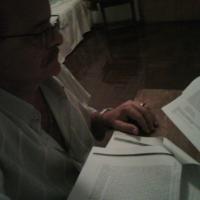Berichten: 86
Taal: English
kosapehape (Profiel tonen) 5 januari 2013 10:04:19
I also use C++, PHP, html, Pascal, SQL.
Demian (Profiel tonen) 5 januari 2013 10:40:09
Tempodivalse:A more correct analogy is to compare Slovio to Esperanto with Slavic roots replacing Romances ones. The grammar is similar in the sense that it's extremely simple. Also much (over 90 per cent) of the vocabulary is from Russian.brw1:Can any one especially Russians commit on Slovio and tell me if it would help with Russian?I'm a somewhat-out-of-practice native speaker of Russian. I've looked at the Slovio website and grammar a bit, it reminds me of Interlingua, except with Slavic roots substituted for Romance ones. However, unlike Interlingua, Slovio (at least to my ear) feels rather clunky and lacks aesthetic appeal. On the plus side, I can understand 97% of Slovio with minimal to no prior study, so I suppose the language has accomplished its goal.
I don't know enough about Slovio to advise either way, but my impression is that it may help you grasp basic Russian lexicon and sentence-building concepts. But I doubt it will give you any idea of what Russian inflection is like. Russian has six grammatical cases, considerable verb conjugation, etc. -- all of which are mostly absent in Slovio.
It's Slovianski which is often considered the Slavic equivalent of Interlingua. It can be confused with a real (natural) Slavic language. It retains the case system (albeit simplified) and other grammatical properties common in Slavic languages. It's vocabulary too is derived from principles which are more or less similar to those adopted by the IALA.
Como interlingua, illo es un lingua bellissime. (como - like; illo - it; bellissime - beautiful)
Paulinho (Profiel tonen) 5 januari 2013 13:19:40
VocabGuy (Profiel tonen) 7 januari 2013 20:13:08
tracidmartin (Profiel tonen) 8 januari 2013 06:12:29
jelvinjs7 (Profiel tonen) 25 januari 2013 21:22:09
So that's about 4.5—English, Spanish, and Na'vi all count as 1 each, Esperanto and Hebrew count as 0.5 each, and Latin and Greek count as .25 each.
"kosapehape":I also use C++, PHP, html, Pascal, SQL.





